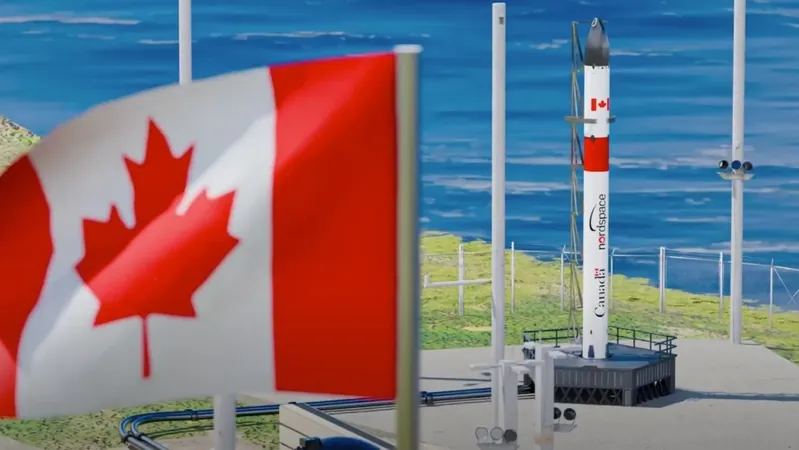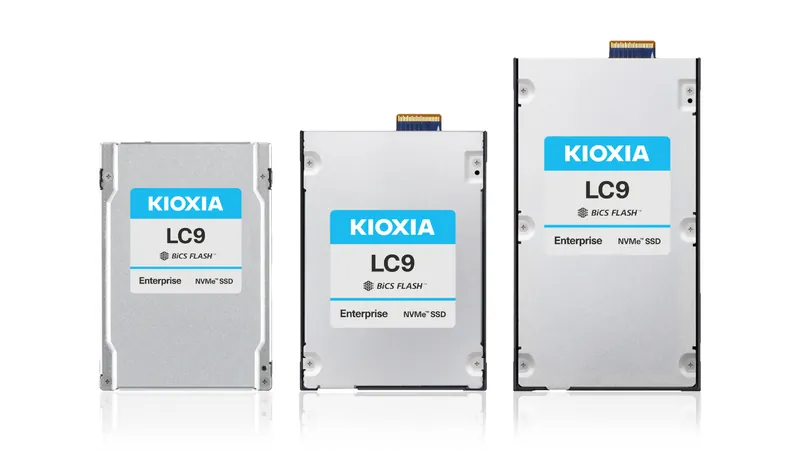
Canada’s Space Ambitions: NordSpace and ProtoSpace Ready to Launch a New Era
2025-07-08
Author: Jia
A New Frontier in Space
On the stunning coast of Newfoundland, a groundbreaking rocket is preparing to soar. Built entirely in Canada, the Taiga rocket, crafted by the ambitious startup NordSpace, is set to make history with the nation’s first liquid-fueled rocket launch. Scheduled for mid-August, this suborbital flight represents a monumental leap for Canada's aspirations to establish its own space industry.
A Collaborative Dream Team
Behind NordSpace is the innovative ProtoSpace, an aerospace arm of Protocase. Known for their rapid production of specialized space-grade components, ProtoSpace is making it possible to meet launch timelines in days rather than weeks or months. Together, these two companies are paving the way for Canada’s independent space industry, seeking to not only create launch infrastructure but also develop domestic satellite payload capabilities.
Canada’s Space Legacy at a Crossroads
Canada has historically been a participant in the cosmic arena, contributing robotic marvels like the Canadarm, but has yet to launch anything from its own territory. "We’ve primarily played a supportive role, but with NordSpace, we want to take the lead in the launch sector," said CEO Rahul Goel. With the Taiga rocket, NordSpace aims to change the narrative.
The Road to Orbital Launches
While the Taiga won’t reach orbit this August, it’s a crucial stepping stone toward NordSpace's ambitious future. Designed to carry over 110 pounds (50 kg) beyond the Karman Line, the initial flight will test the rocket's capabilities. Goel explained, “After this test, we’ll aim for a second flight later this year or early next year to push its limits further.”
A Vision for the Future
NordSpace has a clear roadmap, planning a second flight of the Taiga by 2026 and the launch of the Tundra rocket, capable of carrying 1,100 pounds (500 kg) to low-Earth orbit, by late 2027. The company’s Atlantic Spaceport Complex (ASX) is designed for a range of launch inclinations, making it suitable for various missions. Goel is determined to see at least one launch per month by the end of the decade.
National Security Drives Demand
The push for Canadian launch capabilities is also fueled by national security demands. Goel emphasized, "Canadian payloads are a big motivator. We want to avoid reliance on foreign partners for our vital assets in space.” In a climate where having their own launch capability is increasingly prioritized, this initiative seems timely.
Innovation Unchained
NordSpace embarks on its rocket-building journey with in-house development while utilizing ProtoSpace for rapid manufacturing. Taiga’s engines are 3D printed and tested in their facilities. Goel initially assumed they would need many imports but quickly discovered a wealth of innovative companies nearby.
Navigating Regulatory Challenges
However, launching rockets from Canada isn’t without challenges. The regulatory landscape, still adapting to private aerospace companies, poses hurdles. Goel is pushing for regulations that support innovation rather than stifle it. He hopes that with successful tests, the perception of risk aversion in Canada will evolve.
Building a Collaborative Future
NordSpace isn’t just focused on its own operations. The ASX will include launch pads for third-party use, opening doors for other companies, both domestic and international. Goel’s commitment is not merely to his company but to constructing an infrastructure that bolsters the entire Canadian space industry.
A Global Model for Space Development
NordSpace’s mission echoes beyond Canada. They are already in discussions with countries looking to develop their own space programs, presenting a scalable model that transcends borders. Goel asserts, "This isn’t about a billion-dollar project; we can achieve this with less than $100 million."
A Symbol of Canadian Innovation
For Goel, this project symbolizes more than just financial success; it stands as a testament to Canada’s capacity for innovation in various fields. "I hope this initiative showcases what Canada can accomplish across all sectors, not just in space. Space has a unique ability to inspire and unify," he concluded, looking ahead to a promising future.



 Brasil (PT)
Brasil (PT)
 Canada (EN)
Canada (EN)
 Chile (ES)
Chile (ES)
 Česko (CS)
Česko (CS)
 대한민국 (KO)
대한민국 (KO)
 España (ES)
España (ES)
 France (FR)
France (FR)
 Hong Kong (EN)
Hong Kong (EN)
 Italia (IT)
Italia (IT)
 日本 (JA)
日本 (JA)
 Magyarország (HU)
Magyarország (HU)
 Norge (NO)
Norge (NO)
 Polska (PL)
Polska (PL)
 Schweiz (DE)
Schweiz (DE)
 Singapore (EN)
Singapore (EN)
 Sverige (SV)
Sverige (SV)
 Suomi (FI)
Suomi (FI)
 Türkiye (TR)
Türkiye (TR)
 الإمارات العربية المتحدة (AR)
الإمارات العربية المتحدة (AR)